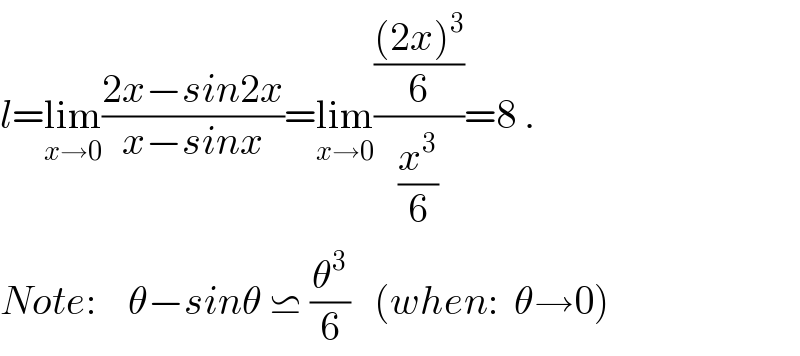
Question Number 19033 by Bruce Lee last updated on 03/Aug/17

Commented by Bruce Lee last updated on 03/Aug/17

$$\boldsymbol{{Help}}\:\boldsymbol{{me}},\:\boldsymbol{{by}}\:\boldsymbol{{no}}\:\boldsymbol{{Lhopital}} \\ $$
Answered by ajfour last updated on 03/Aug/17
![lim_(x→0) ((2x−sin 2x)/(x−sin x)) =lim_(x→0) ((2x−(2x−(((2x)^3 )/(3!))+(((2x)^5 )/(5!))−...))/(x−(x−(x^3 /(3!))+(x^5 /(5!))−...))) =lim_(x→0) (((((2x)^3 )/(3!))[1−(((3!)(2x)^2 )/(5!))+...])/((x^3 /(3!))[1−(((3!)x^2 )/(5!))+...])) =lim_(x→0) (([(((2x)^3 )/(3!))])/([(x^3 /(3!))]))×lim_(x→0) (([1−(x^2 /5)+..terms with higher powers of x])/([1−(x^2 /(20))+...terms with higher powers of x])) =8×1 = 8 .](Q19054.png)
$$\underset{{x}\rightarrow\mathrm{0}} {\mathrm{lim}}\frac{\mathrm{2x}−\mathrm{sin}\:\mathrm{2x}}{\mathrm{x}−\mathrm{sin}\:\mathrm{x}} \\ $$$$=\underset{{x}\rightarrow\mathrm{0}} {\mathrm{lim}}\frac{\mathrm{2x}−\left(\mathrm{2x}−\frac{\left(\mathrm{2x}\right)^{\mathrm{3}} }{\mathrm{3}!}+\frac{\left(\mathrm{2x}\right)^{\mathrm{5}} }{\mathrm{5}!}−...\right)}{\mathrm{x}−\left(\mathrm{x}−\frac{\mathrm{x}^{\mathrm{3}} }{\mathrm{3}!}+\frac{\mathrm{x}^{\mathrm{5}} }{\mathrm{5}!}−...\right)} \\ $$$$=\underset{{x}\rightarrow\mathrm{0}} {\mathrm{lim}}\frac{\frac{\left(\mathrm{2x}\right)^{\mathrm{3}} }{\mathrm{3}!}\left[\mathrm{1}−\frac{\left(\mathrm{3}!\right)\left(\mathrm{2x}\right)^{\mathrm{2}} }{\mathrm{5}!}+...\right]}{\frac{\mathrm{x}^{\mathrm{3}} }{\mathrm{3}!}\left[\mathrm{1}−\frac{\left(\mathrm{3}!\right)\mathrm{x}^{\mathrm{2}} }{\mathrm{5}!}+...\right]} \\ $$$$=\underset{{x}\rightarrow\mathrm{0}} {\mathrm{lim}}\frac{\left[\frac{\left(\mathrm{2x}\right)^{\mathrm{3}} }{\mathrm{3}!}\right]}{\left[\frac{\mathrm{x}^{\mathrm{3}} }{\mathrm{3}!}\right]}×\underset{{x}\rightarrow\mathrm{0}} {\mathrm{lim}}\frac{\left[\mathrm{1}−\frac{\mathrm{x}^{\mathrm{2}} }{\mathrm{5}}+..\mathrm{terms}\:\mathrm{with}\:\mathrm{higher}\:\mathrm{powers}\:\mathrm{of}\:\:\mathrm{x}\right]}{\left[\mathrm{1}−\frac{\mathrm{x}^{\mathrm{2}} }{\mathrm{20}}+...\mathrm{terms}\:\mathrm{with}\:\mathrm{higher}\:\mathrm{powers}\:\mathrm{of}\:\:\mathrm{x}\right]} \\ $$$$=\mathrm{8}×\mathrm{1}\:=\:\mathrm{8}\:. \\ $$
Answered by behi.8.3.4.1.7@gmail.com last updated on 04/Aug/17

$${l}=\underset{{x}\rightarrow\mathrm{0}} {\mathrm{lim}}\frac{\mathrm{2}{x}−{sin}\mathrm{2}{x}}{{x}−{sinx}}=\underset{{x}\rightarrow\mathrm{0}} {\mathrm{lim}}\frac{\frac{\left(\mathrm{2}{x}\right)^{\mathrm{3}} }{\mathrm{6}}}{\frac{{x}^{\mathrm{3}} }{\mathrm{6}}}=\mathrm{8}\:. \\ $$$${Note}:\:\:\:\:\theta−{sin}\theta\:\backsimeq\:\frac{\theta^{\mathrm{3}} }{\mathrm{6}}\:\:\:\left({when}:\:\:\theta\rightarrow\mathrm{0}\right) \\ $$
